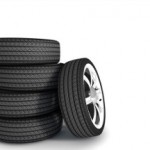Your ability to control your vehicle depends on the traction between your tires and the road. Tires don’t need to have tread designs or much tread depth to give you traction on a dry road, but tires do require tread designs to generate traction on wet, slushy or snow-covered roads.
A tread design is necessary to direct water and slush from between the tire and the road, as well as provide edges that cut into the snow. When water collects on the road surface during a rainstorm, the depth of the water, the speed you are driving and your car’s weight, along with the tires’ tread design and depth, are all factors in determining when and if the tires will stop the car quickly or force it to hydroplane or float. 
It isn’t difficult to understand that the tread on tires will wear away over their life and the volume of their tread grooves will be reduced. This is a gradual process and you may not notice it day-to-day, but eventually there will be a time when you notice your car slip in the snow or hydroplane in the rain or just not stop quickly when the road is wet.
So when do you replace tires? If rain and wet roads are your main concern, it’s recommended you replace your tires when they reach approximately 4/32″ of remaining tread depth. Since water can’t be compressed, you need enough tread depth to allow the rain to escape through the tire’s grooves. If the water can’t escape fast enough, your vehicle’s tires will be forced to hydroplane on top of the water, losing traction and increasing your stopping distance.
If you drive on snow-covered roads you should replace your tires when they reach approximately 6/32″ of remaining tread depth so you can maintain good mobility. You need more tread depth in snow because your tires need to compress the snow in their grooves and release it as they roll. If there isn’t sufficient tread depth, the “bites” of snow your tires can take on will be reduced and your vehicle’s traction and mobility will be sacrificed.
While replacing your tires before they are completely worn out may not seem to be very economical, it is far less expensive than repairing your car after you’ve had an accident because your tires needed to be replaced and weren’t!
When you replace the tires on your vehicle it is recommended that you replace all four tires at the same time and also have your car checked to make sure it is aligned properly. All these steps will give you longer life for your replacement tires.
For all of your Denver Auto Repair needs, trust Express Car Care. Call (303) 691-2760 or stop by our shop today.
